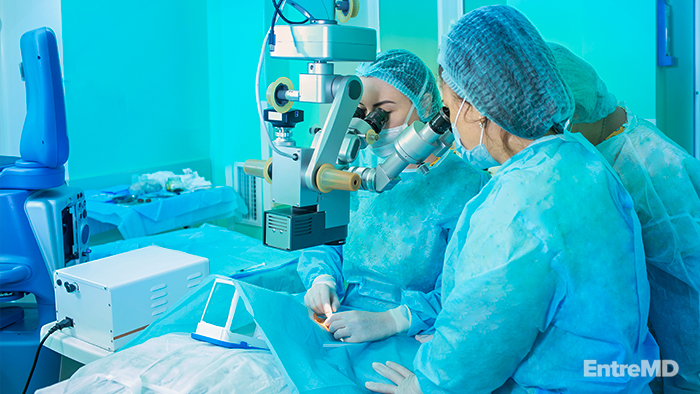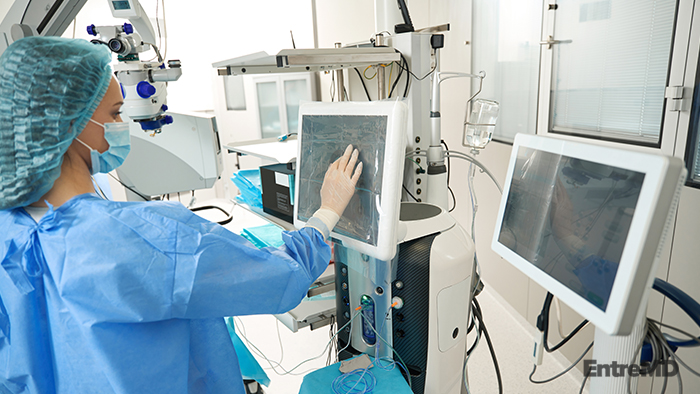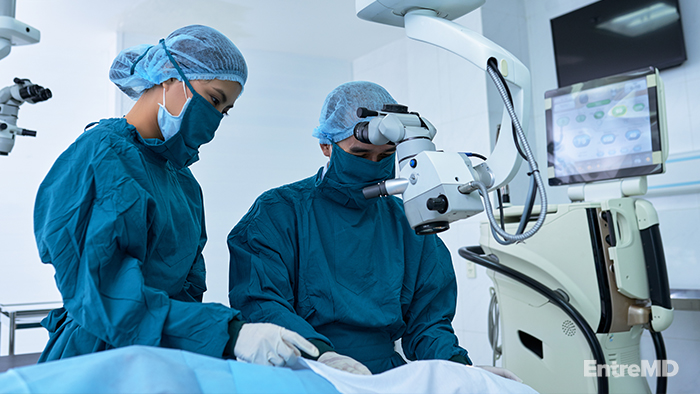If you’re a doctor looking for an alternative career path, the range of options can feel pretty overwhelming. Should you teach? Get a career in pharma? Throw in your stethoscope and open a bakery?
Choosing a new career isn’t a decision to take lightly– it’s important to do some soul-searching and determine what it is about your current path that isn’t working for you. No matter what you choose, you want to make sure it’s something that you’ll be happy with decades down the road.
If you’re interested in shifting your focus within the realm of medicine rather than quitting altogether, and the thought of working with advanced, cutting-edge technology in an ever-evolving field excites you, you’ll want to learn a bit more about microsurgery.
To be clear, becoming a microsurgeon does not necessarily mean an improved work-life balance. There’s a huge range of specialties you can focus on and settings you can work within in microsurgery, some of which might not provide you much more headspace or personal life than your current position.
That being said, there are some routes you can take within microsurgery that could potentially afford you more control over your schedule. Additionally, it’s possible that participating in a cutting-edge field that can have a tremendous impact on patient quality of life is exactly what you’re looking for. So, without further ado, let’s look at what you should know about microsurgery.
What Is Microsurgery?
A subspecialty of surgery, microsurgery involves precision instruments and specialized microscopes that allow surgeons to perform surgeries on structures too small to be seen by the naked eye. Advancements in technology have allowed surgeons to perform on small structures such as blood vessels and nerves with exceptional precision and accuracy.

Microsurgeons specialize in operating on delicate tissues and organs in order to perform complex surgical procedures. Microsurgeons can work in a wide variety of settings, including clinics, research facilities, and hospitals. As demand for microsurgical procedures increases, so does the demand for qualified microsurgeons.
Different Job Opportunities in Microsurgery
There are a variety of settings in which microsurgeons can work, including clinics, hospitals, and research facilities.
Hospitals: Microsurgeons can work in community hospitals and academic medical centers as a part of a specialized division within a surgical specialty or as a part of the surgical department.
Hand surgery centers: Microsurgeons specializing in hand and upper extremity microsurgery might work in specialized hand surgery centers. These centers can either operate independently or be affiliated with hospitals.
Plastic and reconstructive surgery clinics: Those specializing in plastic and reconstructive surgery can work in clinics focusing on reconstructive and cosmetic procedures. These centers can either operate independently or be affiliated with hospitals.

Research institutions: Some microsurgeons work to develop new technologies and techniques as well as conduct studies within research institutions.
Military medical facilities: Microsurgeons can also provide care to military personnel who have suffered traumatic injuries. They might be stationed at military hospitals or be part of a specialized surgical team.
Academic institutions: Microsurgeons can also work in association with academic institutions, such as teaching hospitals or medical schools.
NGOs and international organizations: Microsurgeons can also work with non-governmental organizations to provide surgical care in countries affected by disasters or conflict.
Specializations in Microsurgery
Microsurgeons can specialize within the larger field of microsurgery.

Some of these specializations include:
- Plastic and reconstructive microsurgery: Plastic surgeons who specialize in microsurgery can perform procedures such as composite tissue transplantation, free flap surgery, and tissue transfer.
- Hand and upper extremity microsurgery: Specializing in surgical procedures that involve the hands and upper extremities, this can involve repairing damaged nerves, tendons, and blood vessels as well as performing intricate and complex reconstructions.
- Pediatric microsurgery: A pediatric microsurgeon performs intricate procedures involving small structures on infants, children, and teens.
- Oncologic microsurgery: In this field, microsurgeons can be involved in various aspects of cancer treatment. This includes procedures such as lymph node dissection, tumor resections, vascular reconstruction, nerve-sparing surgery, and more.
- Replantation microsurgery: Microsurgeons can specialize in the necessary techniques for the surgical reattachment of body parts, such as limbs, hands, or fingers. Procedures can involve repairing nerves, blood vessels, and other tissues.
- Urologic microsurgery: This type of microsurgery focuses on procedures that involve the reproductive systems of both men and women, including varicocelectomy, vasectomy reversal, and microsurgical sperm retrieval.
- Head and neck microsurgery: Microsurgeons specializing in this field can treat tumors, restore function to various structures like the tongue and larynx, and reconstruct defects after cancer resections.
- Orthopedic microsurgery: Specializing in the treatment of orthopedic conditions, these surgeons can perform procedures such as joint reconstruction, nerve decompression, and bone grafting.
- Vascular microsurgery: In this specialty, microsurgeons can perform delicate, precision procedures on blood vessels, such as vessel repair or bypass grafting.
- Ophthalmic microsurgery: Microsurgeons that focus on ophthalmology perform procedures involving the eyes and the structures surrounding them. This can include retinal detachment repair, corneal transplantation, and cataract surgery.
Essential Qualities For Successful Microsurgeons
There are a number of qualities and skills that are simply necessary in order to be successful in the field of microsurgery.

While the complete list is long, here are some important highlights that you will want to keep in mind when contemplating microsurgery as an alternative career path:
- Attention to detail: The accuracy and precision required to be a successful microsurgeon cannot be overstated. In order to ensure the success of each procedure, surgeons must be able to maintain a great deal of focus and attention to detail for extended periods of time.
- Critical thinking: Even during planned procedures, you will sometimes still need to make quick decisions based on critical thinking. Being able to stay calm in high-pressure situations is also essential.
- Patience: Microsurgical procedures can be quite time-consuming. This means that microsurgeons need to have a lot of patience and be able to maintain focus for long periods of time without becoming fatigued.
- Manual dexterity and fine motor skills: Since microsurgeons need to manage and manipulate very small instruments with extreme precision, they need to have a high level of manual dexterity.
- Empathy: Microsurgeons also need to have excellent interpersonal skills and communication skills. Patients and their families will require support before, during, and after the surgery, and surgeons should, therefore, be highly skilled when it comes to empathetically relating to patients.
Reasons Why Microsurgery Is an Appealing Alternative Career Path for Doctors
Are you considering microsurgery but aren’t sure if it’s the right path for you? Let’s take a look at some of the reasons why microsurgery is an appealing alternative option.
Cutting Edge Techniques
When you work as a microsurgeon, you’re utilizing cutting edge technologies and techniques to perform incredibly complex procedures. Depending on your specialty, you can perform remarkably delicate operations on nerves, tiny blood vessels, and other structures that historically would have been impossible to access using conventional methods.

Being involved in such an innovative field can help keep the work intellectually stimulating for some individuals. If a more traditional path had you feeling like you were lagging behind in terms of engaging with the incredible world of medical advancements, microsurgery could be worth looking into.
Precision and Technical Skills
If you have a keen eye for detail and enjoy precise work with your hands, microsurgery can be an exciting career option.

A unique opportunity to utilize your technical expertise and ability to use extreme precision, this is a role that can only be occupied with highly tuned motor skills.
Patient Impact
Though there are many different specialties within microsurgery, the field overall often focuses on procedures that aim to help patients regain form and function. For example, a microsurgeon could work in a capacity where they help to reconstruct facial features, transplant organs, reattach severed limbs, or perform delicate nerve repairs.

If you’ve felt disenchanted by the patient-doctor relationship in your current position– feeling like all you do is write a prescription before you have to rush off to the next patient– you could potentially find microsurgery highly rewarding. In many cases, you are participating in a surgery that will significantly improve the well-being and quality of life of patients.
Wide Range of Applications
Another appealing aspect of microsurgery as a field is that there is a wide range of applications in a number of different fields.

Microsurgeons can choose to specialize in everything from neurosurgery to plastic surgery and can work in a wide range of settings.
Research and Academic Opportunities
If you’re interested in continuing to work in medicine but feel done with clinical practice, there are also many research and academic opportunities in microsurgery.

Since this is a field that is at the cutting edge of medical technology, you could potentially help shape the future of the field while also working to train and inspire the next generation of microsurgeons.
Work-Life Balance
Being a microsurgeon can potentially provide more work-life balance than other paths that doctors typically take. However, how this works out will have a lot to do with the specialty you choose and the setting you work in.
For example, in the field of reconstructive surgery, procedures are typically planned rather than resulting from emergency situations. This means that microsurgeons can often have a greater amount of control over their schedule than in other medical fields.

That being said, the procedures are highly delicate by nature, and this can also be a very high-stress and high-pressure career. Hours can still be long, workloads can be demanding, and the amount of education and training required is significant.
If burnout is one of the primary reasons you’re searching for an alternative career path, microsurgery may or may not relieve the long hours and heavy workload you’re looking for. To learn more about other potential careers that utilize your medical expertise, skills, and knowledge, take a look at our guides to medical consultants, transitioning to a career in pharma and becoming a physician coach. You’ll also want to check out my five tips for doctors who don’t want to practice medicine anymore.
High Demand
The microsurgery market is expected to grow from $1,719.39 million in 2021 to $2849.86 million by 2028, according to a report published by Vantage Market Research.

They posit that the growth of this industry is due to:
- Technological advancements in microsurgical techniques and instruments
- Rising demand for minimally invasive surgical procedures
- Rising cases of chronic disease
These factors are expected to drive the growth of this market in the years to come. Individuals concerned about their future in a more traditional healthcare setting might be interested to learn more about the projected growth of this industry and the potential for it to provide a lucrative and stable career.
High Salary
Of course, another appealing aspect of this field is the salary. There can be quite a bit of variation in microsurgeon salaries depending on location, experience, and specialization.

In the US, the estimated salary range for a microsurgeon is $300,000 to $500,000 a year, while estimates in Canada and the UK are 250,000 – CAD 500,000 and £80,000 – £150,000, respectively.
Finding the Right Alternative Path For YOu
Are you a doctor that’s feeling burned out? Do you feel like you want more from both your work and your life?
If so, you’re in the right place.

I’ve worked with hundreds of doctors in order to help them build profitable businesses that help support the lives they want to live. Starting a business requires a different set of skills than those that helped you get through medical school, but that doesn’t mean you’re doomed to live a life of poor work-life balance forever.
My mission is to help physicians learn the precise skills they need to use their expertise and knowledge to create highly profitable, sustainable businesses. Whether you want to start a private practice, product-based business, coaching business, or something else entirely, I’m here to help you live life and practice medicine on your own terms.
Are you ready to engage in work with a deep sense of purpose while also giving you the time and freedom you need? If so, you’ll want to learn more about the EntreMD Business School, designed specifically for physician entrepreneurs, as well as my 1:1 consulting services for individuals who want to scale from six to seven figures over the course of one year.

